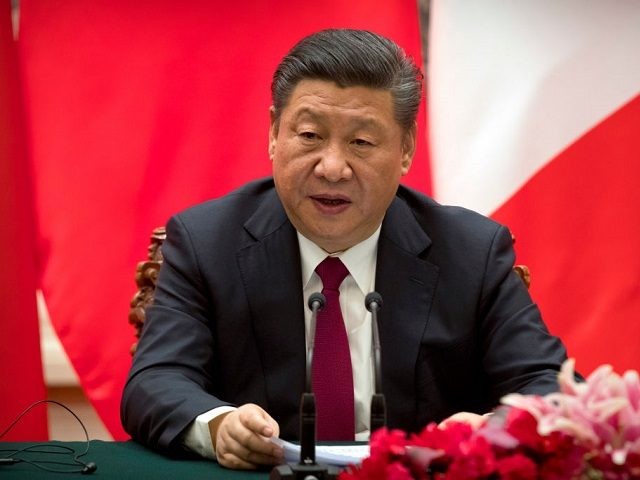Chinese media offered a predictably grim assessment of Election Day in the United States, citing the contest between incumbent President Donald Trump and former Vice President Joe Biden as a sign of “rapid U.S. political decay and decline,” while authoritarian China remains “calm” and “confident.”
China’s state-run Global Times predicted “the decline of U.S. politics in 2020 is destined to be recorded in history,” citing the surge in gun and ammunition purchases as evidence that a civil war is brewing:
The decay is first manifested by the embarrassing situation: Effective governance in the US is relatively or absolutely insufficient. The government’s responsibility – to provide society with the necessary public goods to cope with the impact and challenge of a crisis – is absent.
People are seeing strange and even contradictory signs. The US has the most developed medical technology and system that can “cure” a 74-year-old white elderly man (US President Donald Trump), infected with the novel coronavirus, in just three days. Yet this same country – with about 4 percent of the world’s population – contributes to more than 20 percent of the world’s COVID-19 mortality.
This kind of comparison marks the decline of the US government’s capabilities. In the face of the public crisis caused by the novel coronavirus epidemic, the US government can hardly take any effective measures to counter and control the disease. For the US, which has always regarded itself as the only superpower after the end of the Cold War, the leader of the international system, and the defender of the Western free world, this is clearly a shock to its system.
The Chinese Communist editorial repeatedly mentioned historian Francis Fukuyama, alluding to his book Political Order and Political Decay: From the Industrial Revolution to the Globalization of Democracy – written before the last election.
The ChiComs most likely fell in love with Fukuyama because he fervently criticized Trump’s response to the Wuhan coronavirus pandemic, bolstering Beijing’s favorite talking point. Fukuyama’s salad days were back in the early 1990s, when he thought the collapse of the Soviet Union heralded “the end of history” – that is, the near-universal triumph of classical liberalism over fascist and communist ideology. Today he is being quoted to bash Trump by the rising fascist global hegemon that markets itself as a communist superpower, while classical liberalism is dying around the world, struck down by China’s coronavirus.
The Global Times built on more recent comments by Fukuyama to suggest that President Trump is some bizarre historical aberration, a “negative influence that exceeds the system’s threshold to function” and produced “systemic paralysis” – with the implication that America might resume being a reasonably sane country that Beijing can do business with if Biden wins.
Another Global Times editorial asserted China is serenely confident of its growing power and will “focus on its own development” instead of expecting the next U.S. president to “fix bilateral ties.” Chinese citizens supposedly are not even discussing the American election on the heavily censored social media platforms their government permits them to use.
The Global Times quoted “Chinese experts” who praised the resiliency of China’s economy after the coronavirus and dismissed the U.S. election as “just a show.”
Respectable Chinese media are supposedly reluctant to report on the election because they do not want to be accused of “meddling” in U.S. politics, while the disreputable media owned by political dissidents like Hong Kong’s Jimmy Lai have been busy “spreading disinformation and rumors with attacks on Biden and his family.”
The “Chinese experts” said social unrest and “anti-science ideological extremism” have made the U.S. political system “less and less attractive to the Chinese public.” The notion of private citizens fanning out across the country to serve as volunteer poll observers was comically horrifying to the authoritarian Chinese editorialists, who saw it as a sign of political decay.
A third Global Times editorial wondered if “local or larger-scale riots” might break out because of the election, taking the possibility as another sign of decay for the once-stable American republic:
This situation reflects the trend of political fanaticism in the US. In the past, only the election outcome, not the election itself, was uncertain. This had been a political and moral high ground for the US as a developed Western country. Americans used to believe that only developing countries would witness serious disputes over their election process, and there might be even riots, with the losing side refusing to accept the outcome. They are not supposed to bother with the same uneasiness as a member of the top country in the West.
The US has to some extent degraded. This is the conclusion. In recent years, the US has ignored rules of the international community. Everything has been oriented toward maximizing American interests. Egoism has flooded both internally and externally. The US domestic political arena also has a tendency to take sides. Lies dominate, the original bottom line of value has been breached, and the end justifies the means. These assumptions have become real problems “all of a sudden.”
The editorial concluded by lamenting that Trump’s China policy has “brought many uncertainties to the U.S. and dealt a heavy blow to global stability” with its “aggressiveness and absurdities,” but since “Biden and Trump are competing with each other over who is tougher on China,” the Democrats will probably be pushed into a tougher stance on China than they would normally prefer, even if they win the election.
“Something must have gone wrong with the U.S.’ national competitiveness and its social governance. The country needs serious and profound domestic reforms, which will be an arduous task,” the Global Times fretted.

COMMENTS
Please let us know if you're having issues with commenting.